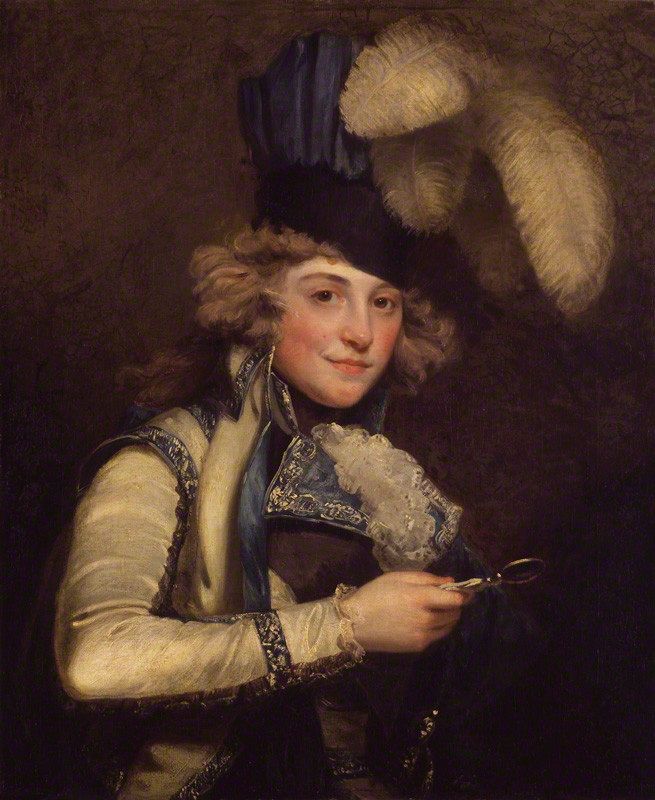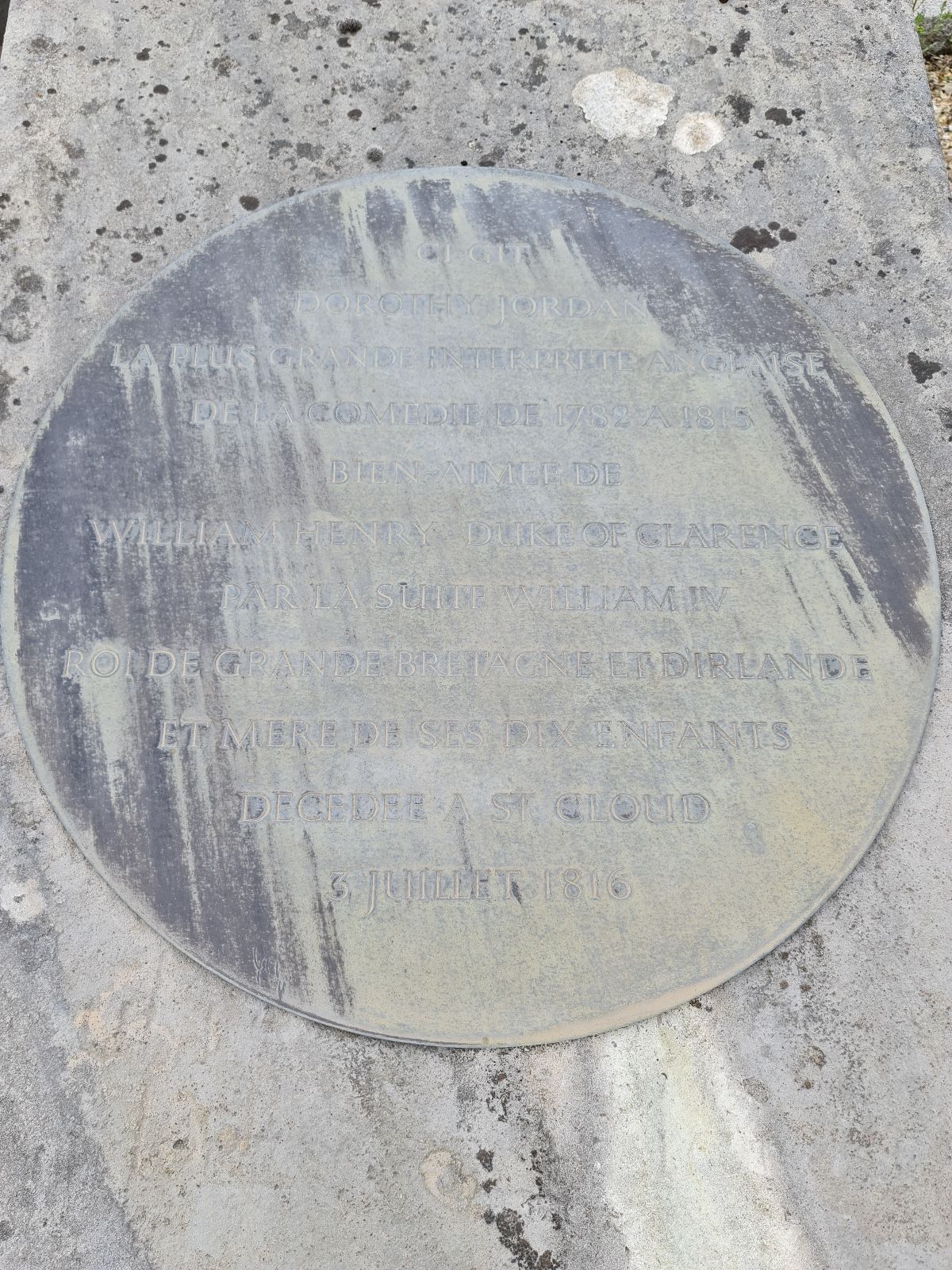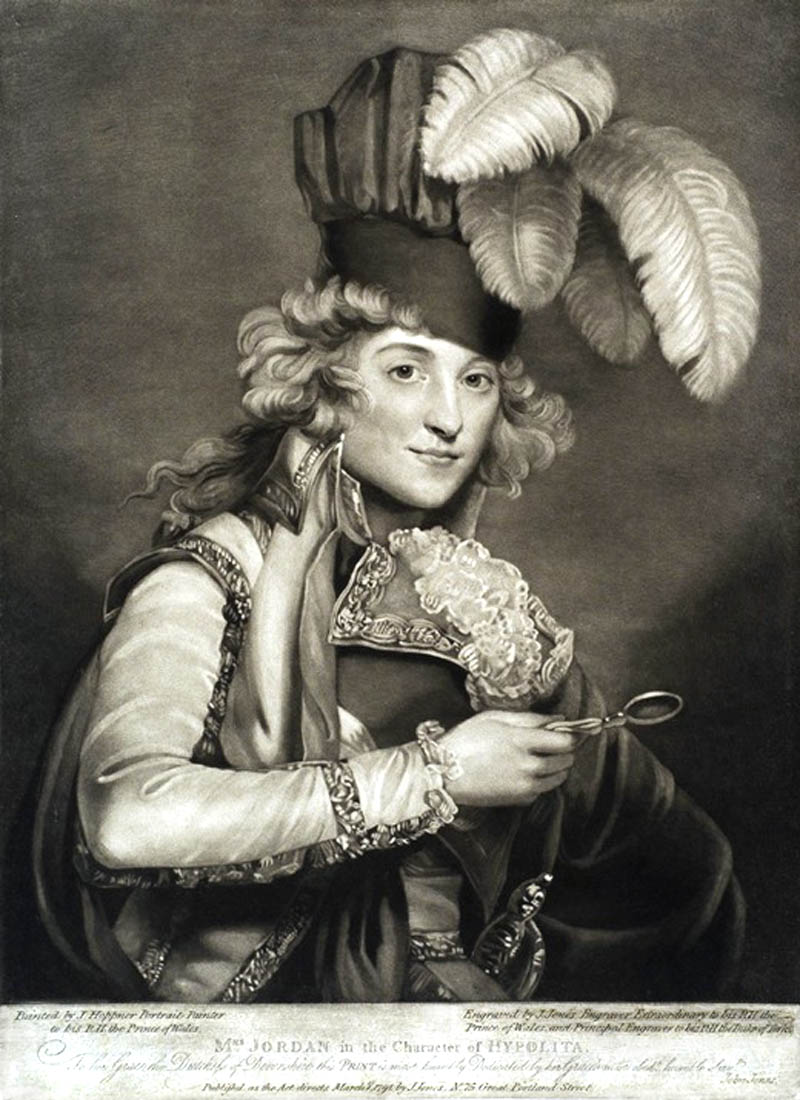Dorothea, also called Dora, got her start on the stage in Dublin in 1774. She was 13. She went on stage to help support her family after her father, who worked as a stage hand, abandoned them. He sent back money to help the family, but not enough. Dora's mother was also an actress. She saw that Dora had potential as an actress, and set her on her course. By 20, Dorothy was having an affair with Richard Daly. He was her first boss. She also had her first child, Frances, by him.
She went on to England, where she met a lieutenant in the army, Charles Doyne. He loved her so much that he asked her to marry him. She turned him down. It's during this time that she first started using the name Mrs. Jordan. It's a reference to her escape across the Irish Sea, likened to the River Jordan. It was considered somewhat more respectable for a married woman to be on stage. There was, in fact, no Mr. Jordan, and Dorothy never married.
She was famous for her comedic timing, and has been called the most famous comedic actress of her time. It was also said that she had the most beautiful legs ever seen on stage. Her audiences really enjoyed seeing her in breeches roles. These roles let her wear the tight knee-length pants that were men's wear in her time.
When her affair with Doyne ended, Jordan started working with the Tate Wilkinson company. She started an affair with the male lead, George Inchbald. Claire Tomalin, who was Dorothea's biographer, said that Jordan would have married him because he loved her so much. However, he never asked her.
In 1786 she broke it off with Inchbald to start an affair with lawyer and police magistrate, Sir Richard Ford. He said that he would marry her, so she moved in with him. They had three children together, a son who died shortly after his birth, and two daughters. When she realized he was never going to marry her, she left him and began her most famous affair.
In 1791, His Royal Highness, William, Duke of Clarence, future King William IV of England, took notice of the pretty, witty and intelligent actress, Mrs. Dorothy Jordan. They were together for 20 years. This long term relationship has been credited with helping William to be the most stable and successful of all of King George III's children.
She moved into Bushy House with him. It appears that she never really interested herself in any of the politics, intrigues or behind the scenes action at court. She made necessary appearances with the Duke, and continued her acting career. Together they had 10 known children, who all took the name FitzClarence. Most of those children went on to have very advantageous marriages and become prominent people in English society. Her descendants include David Cameron, Prime Minister of England, and Their Royal Highnesses Princes Alexandra, Duchess of Fife and Princess Maud, Countess of Southesk, who were also great-granddaughters of Queen Victoria.
William and Dorothea parted ways in 1811. He kept custody of their five sons. He allowed her to take their daughters with her. His Highness gave her a yearly stipend. The stipend and her retained custody of her daughters were conditional on the fact that she not return to the stage. She was able to stay with that until 1814, when a son-in-law forged her name and put her deeply in debt. When the Duke heard what happened, he stopped the stipend and took custody of their daughters.
Broken-hearted, and broke, she fled to France in 1815, likely fleeing from her creditors. Using the name Mrs. James, she settled in Saint-Cloud, where she died, in poverty, in 1816.
==========
In her burial, as in her death, Dorothy Jordan was dependent upon strangers. The ground in which her body lay was chosen by Greatorex, and strangers, more important for kindliness of heart than for rank, paid for the stone which marks the spot. A gentleman, named Henry Woodgate, of Dedham, Essex, had with his wife seen Dorothy shortly before her death, and he ordered a dark granite slab, writing to Genest, the great theatrical authority, to send him an inscription for it. This inscription, both in Latin and in English, is as follows—
"Sacred to the memory of DOROTHY JORDAN, who, for a series of years, in London as well as other cities of Britain pre-eminently adorned the Stage. For Comic Wit, sweetness of voice, and imitating the manners and customs of laughing maidens, as well as the opposite sex, she ranked second to none in the display of that Art, wherein she was so pre-eminently skilled. Neither was any one more prompt in relieving the necessitous. She departed this life the 5th of July, 1816, aged fifty. Remember and weep for her!"
— The story of Dorothy Jordan (Clare Armstrong Bridgman, 1861- Jerrold)
Dorothea, also called Dora, got her start on the stage in Dublin in 1774. She was 13. She went on stage to help support her family after her father, who worked as a stage hand, abandoned them. He sent back money to help the family, but not enough. Dora's mother was also an actress. She saw that Dora had potential as an actress, and set her on her course. By 20, Dorothy was having an affair with Richard Daly. He was her first boss. She also had her first child, Frances, by him.
She went on to England, where she met a lieutenant in the army, Charles Doyne. He loved her so much that he asked her to marry him. She turned him down. It's during this time that she first started using the name Mrs. Jordan. It's a reference to her escape across the Irish Sea, likened to the River Jordan. It was considered somewhat more respectable for a married woman to be on stage. There was, in fact, no Mr. Jordan, and Dorothy never married.
She was famous for her comedic timing, and has been called the most famous comedic actress of her time. It was also said that she had the most beautiful legs ever seen on stage. Her audiences really enjoyed seeing her in breeches roles. These roles let her wear the tight knee-length pants that were men's wear in her time.
When her affair with Doyne ended, Jordan started working with the Tate Wilkinson company. She started an affair with the male lead, George Inchbald. Claire Tomalin, who was Dorothea's biographer, said that Jordan would have married him because he loved her so much. However, he never asked her.
In 1786 she broke it off with Inchbald to start an affair with lawyer and police magistrate, Sir Richard Ford. He said that he would marry her, so she moved in with him. They had three children together, a son who died shortly after his birth, and two daughters. When she realized he was never going to marry her, she left him and began her most famous affair.
In 1791, His Royal Highness, William, Duke of Clarence, future King William IV of England, took notice of the pretty, witty and intelligent actress, Mrs. Dorothy Jordan. They were together for 20 years. This long term relationship has been credited with helping William to be the most stable and successful of all of King George III's children.
She moved into Bushy House with him. It appears that she never really interested herself in any of the politics, intrigues or behind the scenes action at court. She made necessary appearances with the Duke, and continued her acting career. Together they had 10 known children, who all took the name FitzClarence. Most of those children went on to have very advantageous marriages and become prominent people in English society. Her descendants include David Cameron, Prime Minister of England, and Their Royal Highnesses Princes Alexandra, Duchess of Fife and Princess Maud, Countess of Southesk, who were also great-granddaughters of Queen Victoria.
William and Dorothea parted ways in 1811. He kept custody of their five sons. He allowed her to take their daughters with her. His Highness gave her a yearly stipend. The stipend and her retained custody of her daughters were conditional on the fact that she not return to the stage. She was able to stay with that until 1814, when a son-in-law forged her name and put her deeply in debt. When the Duke heard what happened, he stopped the stipend and took custody of their daughters.
Broken-hearted, and broke, she fled to France in 1815, likely fleeing from her creditors. Using the name Mrs. James, she settled in Saint-Cloud, where she died, in poverty, in 1816.
==========
In her burial, as in her death, Dorothy Jordan was dependent upon strangers. The ground in which her body lay was chosen by Greatorex, and strangers, more important for kindliness of heart than for rank, paid for the stone which marks the spot. A gentleman, named Henry Woodgate, of Dedham, Essex, had with his wife seen Dorothy shortly before her death, and he ordered a dark granite slab, writing to Genest, the great theatrical authority, to send him an inscription for it. This inscription, both in Latin and in English, is as follows—
"Sacred to the memory of DOROTHY JORDAN, who, for a series of years, in London as well as other cities of Britain pre-eminently adorned the Stage. For Comic Wit, sweetness of voice, and imitating the manners and customs of laughing maidens, as well as the opposite sex, she ranked second to none in the display of that Art, wherein she was so pre-eminently skilled. Neither was any one more prompt in relieving the necessitous. She departed this life the 5th of July, 1816, aged fifty. Remember and weep for her!"
— The story of Dorothy Jordan (Clare Armstrong Bridgman, 1861- Jerrold)
Inscription
Sacred to the memory of DOROTHY JORDAN, who, for a series of years, in London as well as other cities of Britain pre-eminently adorned the Stage. For Comic Wit, sweetness of voice, and imitating the manners and customs of laughing maidens, as well as the opposite sex, she ranked second to none in the display of that Art, wherein she was so pre-eminently skilled. Neither was any one more prompt in relieving the necessitous. She departed this life the 5th of July, 1816, aged fifty. Remember and weep for her!
Family Members
-
![]()
George Augustus Frederick FitzClarence 1st Earl of Munster
1794–1842
-
![]()
Sophia Fitzclarence Sidney
1796–1837
-
![]()
Lady Mary FitzClarence Fox
1798–1864
-
![]()
Lieutenant-General Lord Frederick FitzClarence
1799–1854
-
![]()
Lady Elizabeth Fitzclarence Hay
1801–1856
-
![]()
Rear Admiral Lord Adolphus FitzClarence
1802–1856
-
Augusta FitzClarence Kennedy-Erskine Gordon-Hallyburton
1803–1865
-
![]()
Rev Augustus FitzClarence
1805–1854
-
![]()
Lady Amelia FitzClarence Cary
1807–1858














